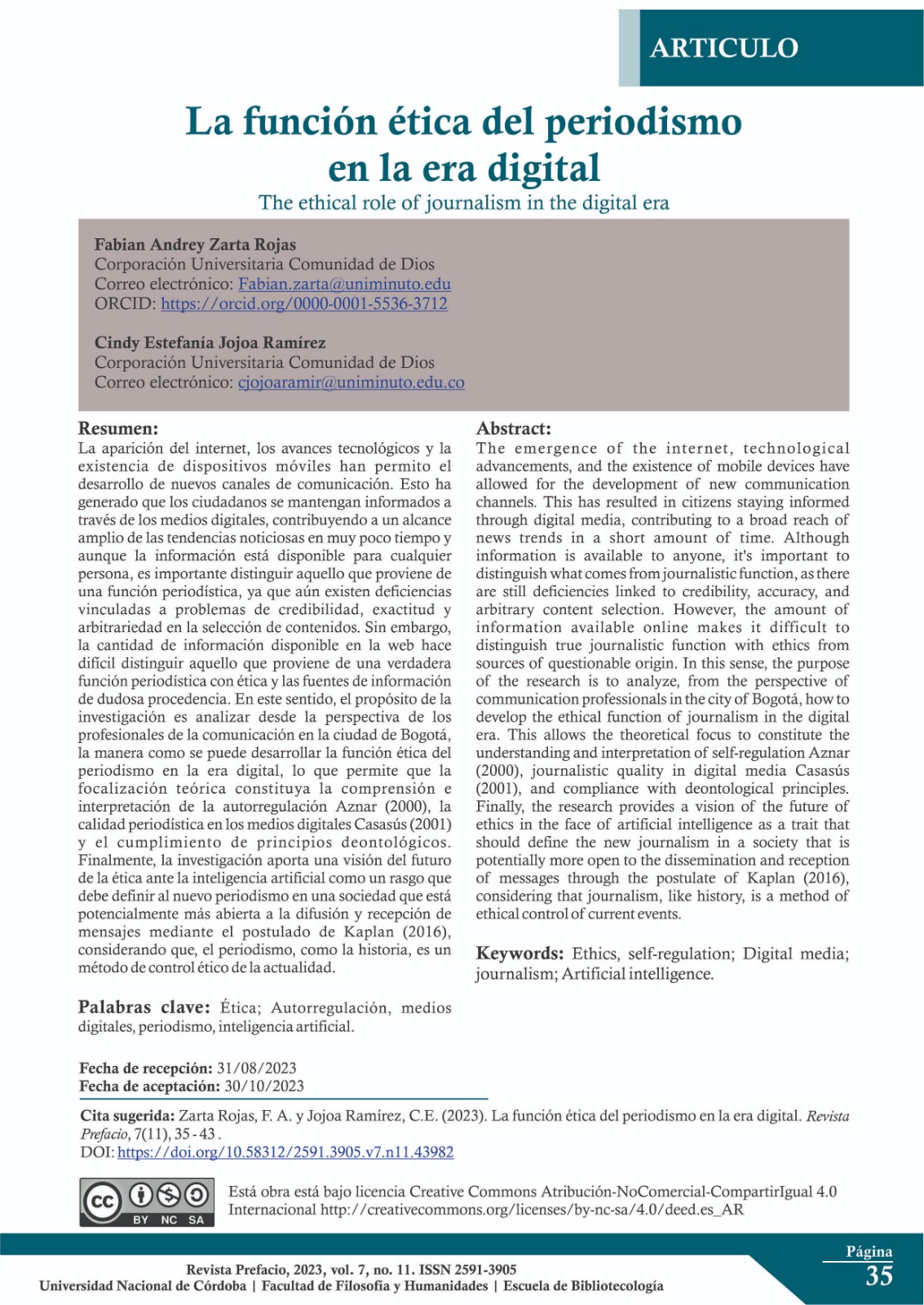The ethical role of journalism in the digital era
DOI:
https://doi.org/10.58312/2591.3905.v7.n11.43982Keywords:
Ethics, Self-regulation, Digital media, Journalism, Artificial intelligenceAbstract
The emergence of the internet, technological advancements, and the existence of mobile devices have allowed for the development of new communication channels. This has resulted in citizens staying informed through digital media, contributing to a broad reach of news trends in a short amount of time. Although information is available to anyone, it's important to distinguish what comes from journalistic function, as there are still deficiencies linked to credibility, accuracy, and arbitrary content selection. However, the amount of information available online makes it difficult to distinguish true journalistic function with ethics from sources of questionable origin. In this sense, the purpose of the research is to analyze, from the perspective of communication professionals in the city of Bogotá, how to develop the ethical function of journalism in the digital era. This allows the theoretical focus to constitute the understanding and interpretation of self-regulation Aznar (2000), journalistic quality in digital media Casasús (2001), and compliance with deontological principles. Finally, the research provides a vision of the future of ethics in the face of artificial intelligence as a trait that should define the new journalism in a society that is potentially more open to the dissemination and reception of messages through the postulate of Kaplan (2016), considering that journalism, like history, is a method of ethical control of current events.
Downloads
References
Aznar, H. (1997). El debate en torno a la utilidad de los códigos deontológicos del periodismo. Anàlisi, 20, 125-144.
Aznar Gómez, H. (2000). Publicidad y ética: la vía de la autorregulación. Revista Latina de Comunicación Social, (25), 1.
Biblioteca Digital CCB (2011). Corte constitucional Sentencia c-186 de 2011. https://bibliotecadigital.ccb.org.co/items/f74e91ce-b1cd-4599-9b04-56ce32fe1f04
Cárdenas, Z. E. C. y Macías, M. R. A. (2022). La ética del periodista en nueva era de los medios digitales de Manta. Periodo 2020. REFCalE: Revista Electrónica Formación y Calidad Educativa, 10(2), 271-286.
Casasús, J. M. (2001). Perspectiva ética del periodismo electrónico. Estudios sobre el mensaje periodístico, 7, 49-55.
Christofoletti, R. y Becker, D. (2020). Retos para la adopción de la transparencia en la agenda de ética periodística en América Latina. Sintaxis, (5), 11-30.
Kaplan, J. (2016). Artificial intelligence: What everyone needs to knowR. Oxford University Press.
Laborda Gil, X. (2005). Tecnologías, redes y comunicación interpersonal. Efectos en las formas de la comunicación digital. Anales de Documentación, vol. 8, 2005.
Micó, J.L., et al. (2008). Informe de la Profesión Periodística 2008. Madrid: Asociación de la Prensa de Madrid.
Maciá-Barber, C. y Herrera-Damas, S. (2010). La deontología periodística: praxis, disfunciones y retos desde la perspectiva de los profesionales de la comunicación en la Comunidad de Madrid (2006-2009). Communication & Society, 23(1), 77-104.
Real-Rodríguez, E. (2018). La profesión periodística ante sus retos éticos: Autorregulación profesional y comunicativa frente a regulación. La situación en España. Estudios sobre el Mensaje Periodístico, 24(1), 341-360.
Ragagnin, F. I. (2007). La actividad periodística entre la ley, la ética y la responsabilidad social: Un diagnóstico de las noticias asociadas al delito. Palabra Clave, 10(1), 1.
Suárez-Villegas, J. C. (2015). Nuevas tecnologías y deontología periodística: Comparación entre medios tradicionales y nativos digitales. Profesional de la Información, 24(4), 390-396.
Villanueva, E. (2002). Autorregulación de la prensa: una aproximación ético-jurídica a la experiencia comparada. Universidad Iberoamericana.








